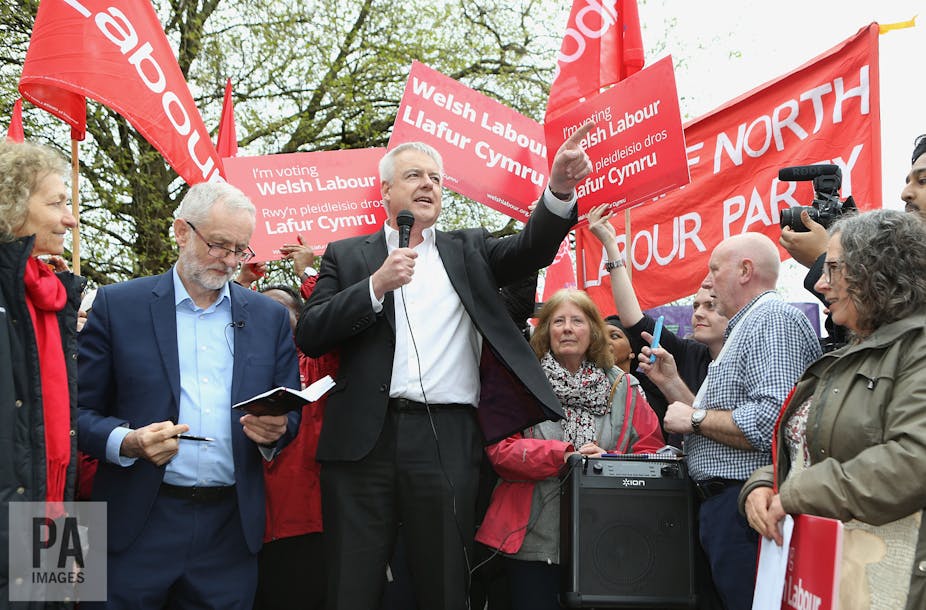When the snap general election was announced, Labour leader Jeremy Corbyn and his party were considered to be too far behind in the polls to be capable of mounting a serious challenge, and many quickly called a comfortable Conservative victory. Fast forward to the day after the votes were counted, and suddenly this election is being hailed as a triumph for Corbyn and Labour, with questions raised about Theresa May’s future as prime minister.
In Wales – a nation so often labelled a “Labour heartland” – this election has been nothing short of a major success for the Labour party. In the first Welsh poll of the election the Conservatives were projected to win by a landslide in Wales, taking ten of Labour’s then 25 seats. Despite this shocking start, the polls gradually turned in Welsh Labour’s favour, and the party now finds itself with three extra seats and an increased vote share of 12.1%.
This result is Labour’s best performance in terms of Wales’ vote share, since the New Labour landslide of 1997 when it came away with 34 of Wales’ 40 seats.
A powerful brand
The power of the Welsh Labour brand can’t be underestimated. Despite UK-wide losses in recent years, in Wales, Labour has been very resilient in the face of this mounting pressure, only losing one seat in the 2016 Welsh Assembly election, and achieving better than expected results in local government elections earlier this year too.
For this election, Labour in Wales took strength from its local successes and ran a very different campaign to that of the national party: “Welsh” Labour was differentiated from Corbyn’s Labour party from the start. Welsh Labour leader Carywn Jones made it clear that though the national and Welsh parties do share some ambitions, a vote for Labour in Wales was a vote for Welsh Labour, not Corbyn.
Can we put Labour’s success in Wales down to the power of Welsh Labour alone? Labour politicians have always argued that “Labour is Wales and Wales is Labour”. Labour tradition in Wales remains strong it seems, and there is possibly an attitude that for a Welshman to vote Tory would be “an act of naked treachery”, as Welsh politician Aneurin Bevan reportedly once said.
But it has been noted many times that there is a lack of a distinctive Welsh media, which raises the issue of whether the “Welsh Labour” message actually got across to the people of Wales. Perhaps strong local campaigning played a significant part in articulating the message to voters, though it is too early to confirm that.
It would be wrong for Welsh Labour politicians to completely dismiss Corbyn’s impact in this campaign. In terms of party leaders’ approval ratings in Wales, his rose from 3.6 out of ten at the end of April, to 4.9 by the eve of polling, while May’s fell by 1.1 from 4.9 to 3.8 in that time.
On election night, many Labour politicians who had previously been critical of Corbyn were forced to answer the question of whether this campaign was a success for the Labour leader. The response from Welsh Labour politicians has tended to stress the importance of both campaigns as positive factors in the success of Labour in Wales. On the night, Jones praised Corbyn for running a “superb campaign”, though he did still emphasise that the Labour campaign had worked because of its focus on a “Labour leadership in Wales and Britain”.
Wales’s winnings
Running a seemingly separate election campaign raises some questions over the relationship between the Welsh branch of the Labour party and the UK leadership. At the time of writing it looks like it may be ambitious to think of a Labour minority government but if that materialises, then there is potential for the Welsh Labour government to achieve some of its devolution ambitions.
Jones secured a commitment to the Welsh government’s alternative Wales bill in the national Labour manifesto, which “would legislate to extend Welsh devolution into the area of justice and policing”. The Welsh leader has, as Richard Wyn Jones put it, managed to seize “control of the constitutional agenda for the devolutionist wing of the Welsh Labour party”.
Among all the talk of deals, minority governments and hung parliaments, the future of Welsh Labour’s relationship with the UK Labour Party and the Corbyn leadership will continue to be an issue in need of discussion. But what’s clear for now is that Wales has very much remained the Labour heartland it has been for so long, and that’s all down to Cardiff Bay and Westminster working separately, together.

